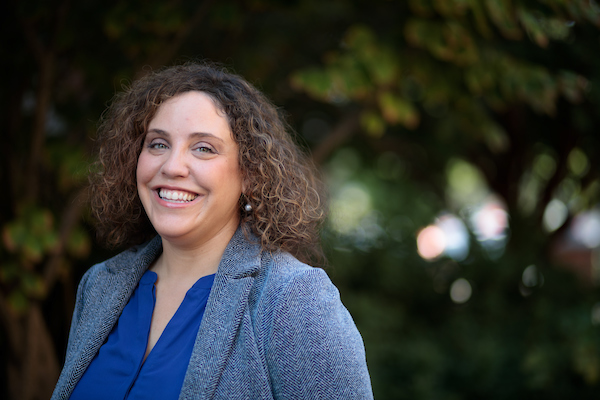
The U.S. presidential election promised a tumultuous fall for political science students and educators. The COVID-19 pandemic further raised the stakes for citizens’ understanding of politics, but also restricted opportunities to promote that understanding. Samford University political science professor and pre-law advisor Marissa Grayson met these multiple challenges by convening students and fellow educators online.
Grayson is a veteran of television interviews about politics, so it isn’t unusual for some of her audiences to see her on screen rather than at the front of a traditional classroom. That’s how she’s teaching everyone during the pandemic, and the transition online has not diminished her dedication to the work.
To give her Samford students the best possible virtual learning experience, Grayson prepared for the fall with a small consortium of faculty from across the U.S. this summer. All were teaching classes similar to her Elections and Political Participation course at Samford. To enrich their courses in a way that would serve all students during the pandemic, the group developed an online guest speaker series that featured politicians, professors, pollsters, campaign strategists, party leaders and journalists. Grayson arranged for speakers Kevin Atkins, a pollster working at a Montgomery firm, and Joyce Vance, former U.S. Attorney for the Northern District of Alabama. Grayson’s students attended events in the series and wrote reflection papers about the speakers’ diverse topics.
Grayson also created expanded offerings for students in her online Political Parties and Interest Groups course. For the first time, she took advantage of the ability to record video comments for assignments in Samford’s Canvas learning management system. When she used the new approach to provide feedback on student research proposals, the students said they enjoyed the in-depth responses. “I was able to be more supportive over video than just use a rubric, marking points off or typing my criticisms of the paper,” Grayson said. She also found that the process of developing the comments on video was faster than typing them. “Even when back in the classroom, I may use this function more,” she said.
As Grayson worked to create virtual Samford classrooms as rewarding as physical ones, she continued her public service in the same way. In October, she led professional development training for all secondary teachers of English, social studies and history in Homewood, Alabama, schools. Her virtual presentation offered suggestions for creating a safe and respectful learning environment to discuss the election and politics, suggested both in-person and virtual activities and assignments, and provided tips for improving students’ information literacy.
Samford political science alumna Emily Hancock ‘15, an 8th grade social studies teacher at Homewood Middle School, was happy to be back in class with her former professor. “I really appreciated her encouragement to lean into political discussions in a constructive manner rather than shying away from them all together,” Hancock said. “Our students are our future, and deserve to be presented with unbiased information that will aid them in understanding their political socialization.” Hancock said she planned to use Grayson’s suggested surveys and questionnaires to help her students identify their own political ideologies. “I enjoyed doing this as a student in Dr. Grayson's classroom and believe it can be affirming and/or enlightening to anyone no matter their stage in life,” Hancock said.
Patrick K. Chappell, director of instruction for Homewood City Schools, also praised Grayson’s collaborative spirit and her sensitive and expert approach to a potentially volatile subject. “I wanted Homewood teachers to approach this unique election season with both confidence and great care,” he said. “Dr. Grayson listened carefully to what I wanted and produced a customized session, complete with research-based strategies and lots of sound advice for what to do—and not do—in their instructional units.”
Chappell said Grayson’s presentation was the quality he expects to find at national conferences, which seems extraordinary given the pandemic’s many obstacles. As students and educators approach the end of this challenging and unprecedented semester, they can be confident that their experience of education is richer for their own extra effort to overcome those obstacles, and for the adaptability, dedication and creativity of Grayson and her Samford colleagues.
